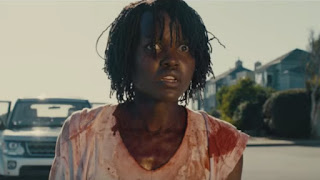I am embarrassed to admit I'm not that well-versed in Korine's oeuvre, but I will say that this film, coupled with his similar candy-colored acid trip, Spring Breakers, have solidified a real dynamic aesthetic that at least appeals to me in a very transgressive way.
The Beach Bum has even less story than Spring Breakers and probably a lot of more gratuitous T&A, but it also somehow feels more authentically Korine, since it is not constrained by anything resembling a traditional narrative and seems to hum and lurch along in its own languid vibe.
 McConaughey plays an apparently wildly successful writer-poet who goes by the name MoonDog. Like a more chipper Hunter S. Thompson, he spends his life careening from encounter to encounter, always with a beer in hand (including his own daughter's wedding, where he goes out of his way to insult the groom) and always with a joint on the way.
McConaughey plays an apparently wildly successful writer-poet who goes by the name MoonDog. Like a more chipper Hunter S. Thompson, he spends his life careening from encounter to encounter, always with a beer in hand (including his own daughter's wedding, where he goes out of his way to insult the groom) and always with a joint on the way.His performance is incredibly committed. He appears to be truly on drugs throughout the film -- and if none of this was for real and/or improvised, than some could argue it was a tour de force. In films like Interstellar and on True Detective, McConaughey proved he could summon dramatic gravitas when he wants to, but with this film he has decided to let it all hang out -- his gut, his junk and his whole scuzzy aura.
For much of the film's running time he bounces around an oddball cast of actors delivering some hilarious performance: there's Martin Lawrence as a ersatz captain of a boat that takes people on dolphin tours that often go horribly wrong, a whacked out Zac Efron as a kind of bizarro Christian revivalist, Snoop Dogg as a variation of himself, Isla Fisher as a randy muse and finally Jonah Hill as his agent, who delivers his line's a homeboy meets New Orleans drawl that had me howling.
Much of what transpires here may try the patience of audiences either seeking a poignant character study or a balls to the wall comedy. Some pretty outrageous, even shocking events transpire, but the movie isn't interested in plot or cohesiveness, per se, Korine is out to set a mood and he does so brilliantly with gorgeous, sun-dripped cinematography, a fantastic soundtrack and a cast that seems entire game to let their freak flags fly.
It may take place in some kind of alternative universe, but it's a pretty undeniably fun one, if you can look past Korine's more indulgent tendencies.
I'm kind of shocked that this film has received such a tepid reaction from critics -- if nothing else, it's a wonderful piece of craftsmanship. And at least for me, this MoonDog earns a little bit of begrudging respect and love by the end of the movie.
I would like to see McConaughey so something different at this point, he can really play a partyboy stoner in his sleep -- and I also think he will never make a film that so effectively cashes in on his public persona than this one.


















